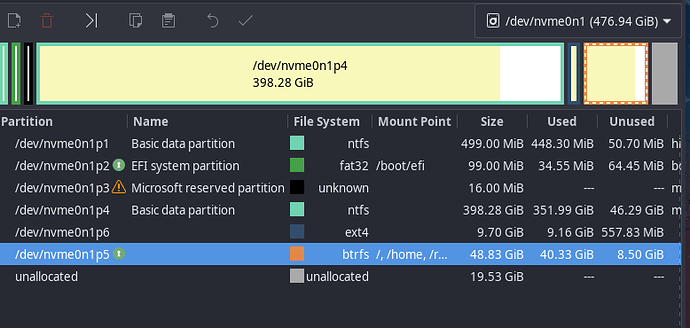System: Kernel: 5.13.13-zen1-1-zen x86_64 bits: 64 compiler: gcc v: 11.1.0
parameters: BOOT_IMAGE=/@/boot/vmlinuz-linux-zen root=UUID=224e5210-da67-4bea-b4da-c093bd85c8e8 rw
rootflags=subvol=@ quiet splash rd.udev.log_priority=3 vt.global_cursor_default=0
systemd.unified_cgroup_hierarchy=1 loglevel=3
Desktop: i3 4.19.1 info: i3bar vt: 7 dm: LightDM 1.30.0 Distro: Garuda Linux base: Arch Linux
Machine: Type: Laptop System: Aftershock product: NH50_70RH v: N/A serial: <filter> Chassis: type: 10 serial: <filter>
Mobo: Aftershock model: NH50_70RH serial: <filter> UEFI: INSYDE v: 1.07.01TASP date: 03/19/2019
Battery: ID-1: BAT0 charge: 37.1 Wh (95.9%) condition: 38.7/47.2 Wh (82.1%) volts: 16.7 min: 14.4 model: Notebook BAT
type: Li-ion serial: <filter> status: Charging
CPU: Info: 6-Core model: Intel Core i7-9750H bits: 64 type: MT MCP arch: Kaby Lake note: check family: 6
model-id: 9E (158) stepping: A (10) microcode: EA cache: L2: 12 MiB
flags: avx avx2 lm nx pae sse sse2 sse3 sse4_1 sse4_2 ssse3 vmx bogomips: 62399
Speed: 2600 MHz min/max: 800/2600 MHz Core speeds (MHz): 1: 2600 2: 2601 3: 2600 4: 2601 5: 2600 6: 2601 7: 2601
8: 2600 9: 1782 10: 2601 11: 2600 12: 2600
Vulnerabilities: Type: itlb_multihit status: KVM: VMX disabled
Type: l1tf mitigation: PTE Inversion; VMX: conditional cache flushes, SMT vulnerable
Type: mds mitigation: Clear CPU buffers; SMT vulnerable
Type: meltdown mitigation: PTI
Type: spec_store_bypass mitigation: Speculative Store Bypass disabled via prctl and seccomp
Type: spectre_v1 mitigation: usercopy/swapgs barriers and __user pointer sanitization
Type: spectre_v2 mitigation: Full generic retpoline, IBPB: conditional, IBRS_FW, STIBP: conditional, RSB filling
Type: srbds mitigation: Microcode
Type: tsx_async_abort status: Not affected
Graphics: Device-1: Intel CoffeeLake-H GT2 [UHD Graphics 630] vendor: CLEVO/KAPOK driver: i915 v: kernel bus-ID: 00:02.0
chip-ID: 8086:3e9b class-ID: 0300
Device-2: NVIDIA GP107M [GeForce GTX 1050 3 GB Max-Q] vendor: CLEVO/KAPOK driver: nvidia v: 470.63.01
alternate: nouveau,nvidia_drm bus-ID: 01:00.0 chip-ID: 10de:1c91 class-ID: 0300
Device-3: Chicony Chicony USB2.0 Camera type: USB driver: uvcvideo bus-ID: 1-8:3 chip-ID: 04f2:b685 class-ID: 0e02
Display: x11 server: X.Org 1.20.13 compositor: picom v: git-dac85 driver: loaded: intel,nvidia
unloaded: modesetting,nouveau alternate: fbdev,nv,vesa display-ID: :0 screens: 1
Screen-1: 0 s-res: 1920x1080 s-dpi: 96 s-size: 508x285mm (20.0x11.2") s-diag: 582mm (22.9")
Monitor-1: eDP1 res: 1920x1080 hz: 60 dpi: 143 size: 340x190mm (13.4x7.5") diag: 389mm (15.3")
OpenGL: renderer: Mesa Intel UHD Graphics 630 (CFL GT2) v: 4.6 Mesa 21.2.1 direct render: Yes
Audio: Device-1: Intel Cannon Lake PCH cAVS vendor: CLEVO/KAPOK driver: snd_hda_intel v: kernel
alternate: snd_soc_skl,snd_sof_pci_intel_cnl bus-ID: 00:1f.3 chip-ID: 8086:a348 class-ID: 0403
Sound Server-1: ALSA v: k5.13.13-zen1-1-zen running: yes
Sound Server-2: JACK v: 1.9.19 running: no
Sound Server-3: PulseAudio v: 15.0 running: yes
Sound Server-4: PipeWire v: 0.3.34 running: yes
Network: Device-1: Intel Cannon Lake PCH CNVi WiFi driver: iwlwifi v: kernel port: 5000 bus-ID: 00:14.3 chip-ID: 8086:a370
class-ID: 0280
Device-2: Realtek RTL8111/8168/8411 PCI Express Gigabit Ethernet vendor: CLEVO/KAPOK driver: r8169 v: kernel
port: 3000 bus-ID: 08:00.1 chip-ID: 10ec:8168 class-ID: 0200
IF: enp8s0f1 state: down mac: <filter>
Device-3: Ralink MT7601U Wireless Adapter type: USB driver: mt7601u bus-ID: 1-1:2 chip-ID: 148f:7601 class-ID: 0000
serial: <filter>
IF: wlp0s20f0u1 state: up mac: <filter>
Bluetooth: Device-1: Intel Bluetooth 9460/9560 Jefferson Peak (JfP) type: USB driver: btusb v: 0.8 bus-ID: 1-14:4
chip-ID: 8087:0aaa class-ID: e001
Report: bt-adapter ID: hci0 rfk-id: 0 state: down bt-service: enabled,running rfk-block: hardware: no software: no
address: <filter>
Drives: Local Storage: total: 476.94 GiB used: 40.42 GiB (8.5%)
SMART Message: Required tool smartctl not installed. Check --recommends
ID-1: /dev/nvme0n1 maj-min: 259:0 model: ASE8TNVME512 size: 476.94 GiB block-size: physical: 512 B logical: 512 B
speed: 15.8 Gb/s lanes: 2 type: SSD serial: <filter> rev: E8TM14.2 temp: 39.9 C scheme: GPT
Partition: ID-1: / raw-size: 48.83 GiB size: 48.83 GiB (100.00%) used: 40.39 GiB (82.7%) fs: btrfs dev: /dev/nvme0n1p5
maj-min: 259:5
ID-2: /boot/efi raw-size: 99 MiB size: 95 MiB (95.96%) used: 30.5 MiB (32.2%) fs: vfat dev: /dev/nvme0n1p2
maj-min: 259:2
ID-3: /home raw-size: 48.83 GiB size: 48.83 GiB (100.00%) used: 40.39 GiB (82.7%) fs: btrfs dev: /dev/nvme0n1p5
maj-min: 259:5
ID-4: /var/log raw-size: 48.83 GiB size: 48.83 GiB (100.00%) used: 40.39 GiB (82.7%) fs: btrfs dev: /dev/nvme0n1p5
maj-min: 259:5
ID-5: /var/tmp raw-size: 48.83 GiB size: 48.83 GiB (100.00%) used: 40.39 GiB (82.7%) fs: btrfs dev: /dev/nvme0n1p5
maj-min: 259:5
Swap: Kernel: swappiness: 133 (default 60) cache-pressure: 100 (default)
ID-1: swap-1 type: zram size: 7.48 GiB used: 0 KiB (0.0%) priority: 100 dev: /dev/zram0
Sensors: System Temperatures: cpu: 68.0 C mobo: N/A
Fan Speeds (RPM): N/A
Info: Processes: 327 Uptime: 23m wakeups: 1 Memory: 7.48 GiB used: 3.04 GiB (40.6%) Init: systemd v: 249 tool: systemctl
Compilers: gcc: 11.1.0 clang: 12.0.1 Packages: 1293 pacman: 1286 lib: 314 flatpak: 7 Shell: Zsh v: 5.8
running-in: alacritty inxi: 3.3.06
Hi all, I needed to take back some space to put into another OS
currently, I am on /dev/nvme0n1p5 as garuda, but would like to take back space to put back into /dev/nvme0n1p6. I am unable to resize to the left, was wondering what the best way to do so was? I am unable to move the unallocated space as well.
